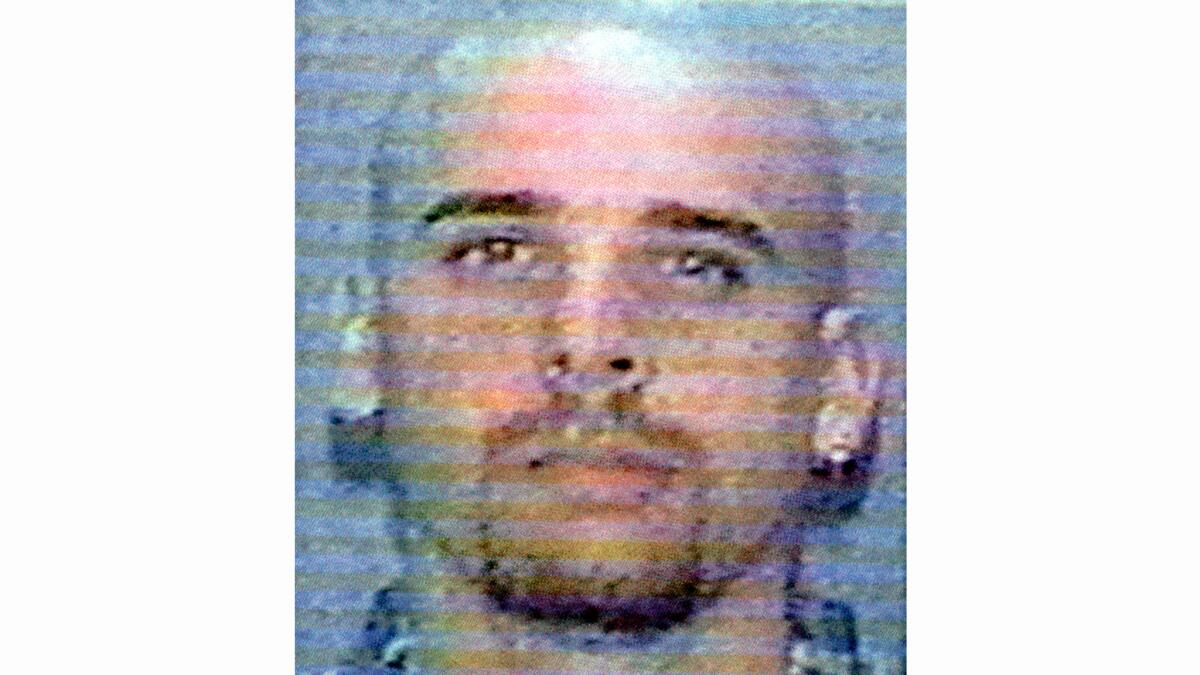New evidence in college student’s death may set the man convicted of killing her free

- Share via
On a February night 16 years ago, Michelle O’Keefe got into her blue Mustang at a parking lot in Palmdale after spending the day working as an extra on a Kid Rock video in Los Angeles.
Suddenly, shots rang out, and the Antelope Valley College student was dead. Police later arrested Raymond Lee Jennings, the parking lot security guard who said he was the first to find her body.
Jennings always insisted he was innocent. After two hung juries, he was finally convicted of murder in 2009 and sentenced to 40 years in prison.
UPDATE: Man convicted of murdering college student set free amid questions over guilt »
But on Wednesday, the Los Angeles County district attorney’s office announced it was asking that Jennings be released from state prison after new evidence was uncovered that raises doubts about his guilt.
Authorities would not provide details about the new evidence but said they will ask a judge to have Jennings released on his own recognizance while law enforcement completes its investigation.
“My office has been presented with credible new evidence that brings this conviction into question,” Los Angeles County Dist. Atty. Jackie Lacey said in a statement. “Attorneys assigned to the newly created Conviction Review Unit have examined the evidence and are working with law enforcement personnel to investigate further. In the interest of justice, I am asking the court to release Raymond Jennings on his own recognizance while this investigation continues.”
Jennings’ appeals attorney, Jeffrey Ehrlich, said he believes there were numerous flaws in the initial investigation, including a failure to look at other people who were at the parking lot at the time of the killing.
Ehrlich said the new investigation uncovered evidence suggesting a robbery or carjacking and that Jennings had nothing to do with it.
“There were other people at the scene, and D.A.’s office was aware of them, but they only looked at Mr. Jennings,” he said.
In a letter to prosecutors, Ehrlich outlined what he considers the weaknesses of their case. The letter noted that there were several people in the parking lot at the time of the killing who were smoking pot and listening to music. Moreover, the letter quoted one of the witnesses as saying she saw a man in Toyota Tercel flee the scene.
Ehrlich argued that investigators failed to look into whether other people in the parking lot might be involved in the murder. He noted in the letter that one of the people in the parking lot that night had ties to street gangs and in the years since was involved in series criminal activities.
David Houchin, Jennings’ former attorney, said he grateful that Jennings was being set free.
“I always believed he was an innocent man,” Houchin said. “I knew justice wasn’t served.”
Jennings was an Army National Guardsman and Iraq war veteran.
Detectives grew suspicious of Jennings when he told them the young woman was still alive when he found her but that he did not perform CPR because he feared contaminating the crime scene. But there was no physical evidence linking Jennings to the crime. No murder weapon was ever found.
Two juries in Los Angeles deadlocked on the case. But prosecutors got a conviction during the third trial, which was held in Lancaster, in the region where O’Keefe lived.
“There was no scientific evidence that implicated Mr. Jennings,” Houchin said in an interview Wednesday. “They couldn’t wait to get that third trial back to Lancaster.”
O’Keefe’s parents rented billboards and adorned them with their daughter’s photo and the message: “I wasn’t ready to die . . . at 18. Can you help catch my killer?” They also filed a wrongful-death lawsuit against Jennings, who gave a statement during a deposition in the case.
Deputy Dist. Atty. Michael Blake argued during the trial that Jennings gave inconsistent accounts in various statements to detectives and in his deposition and revealed details that only the killer would know, such as the order of the shots that were fired.
The prosecutor said the security guard probably made an advance toward O’Keefe and was rebuffed, leading to a confrontation and then the shooting.
“It’s an unspeakable crime for no good reason,” Blake said after the verdict.
Defense attorneys said that Jennings was only speculating about the killing during his interviews and said he inaccurately described one of the victim’s wounds as a gunshot. Medical experts concluded that it was caused by a blow to the head.
Houchin argued during the third trial that jurors were mistakenly given portions of transcripts from interviews of his client that a judge had previously ruled could not be used during the trial.
Ehrlich said he will go to court Thursday along with the district attorney to seek Jennings’ release.
Twitter: @lacrimes
ALSO
Bomb is dropped off at Newhall business for disposal
26 million trees have died in the Sierra since October, raising fire risk
Land around San Andreas fault is rising and sinking, new earthquake research shows
UPDATES:
9 p.m.: Updated with more information from attorney’s letter.
5:22 p.m.: Updated with new top and added details.
More to Read
Sign up for Essential California
The most important California stories and recommendations in your inbox every morning.
You may occasionally receive promotional content from the Los Angeles Times.











